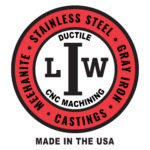Lodi Iron Works offers parts made from iron, steel and meehanite and other special alloys. In this blog we will touch on a question we often hear: which is better for my part or product, iron or steel? Both have benefits and drawbacks that make this answer as varied as the type of projects we create for clients.
Let’s investigate the needs you will have to consider when planning your project. But first, let’s quickly discuss what exactly is the difference in the metals themselves? Iron at its most simplest form is a metal element, the fourth most abundant on our planet in fact. When turned into cast iron it becomes an alloy, containing 2 to 4 percent carbon, along with a few other elements and impurities. Iron is also an essential component of steel, but steel consists of less than 2% carbon. Steel is widely considered to have been created in the 13th century, yet stainless steel has only been around for about a century. Stainless steel was created to solve the oxidizing dilemma carbon steel is susceptible to, and contains a minimum chromium content of more than 10.5% to get it’s stainless quality. Stainless steel may offer a more appealing finish but can be prone to wear resistance leaving carbon steel still dominating steel choices for industrial users. Most widely used is a type of carbon steel called cast steel, with .1 to .5% carbon content.
Iron vs. Steel Casting
So what does this all mean for you, the client? Should you have your parts cast with iron or steel? We briefly discussed the difference between cast steel and stainless steel, but need to investigate whether iron or steel is your better option to begin with. Let’s take a look at what your project needs and which offers the best option:
My finished product will have some detailed elements to it.
For those with complex lines and other detail work, cast iron is the best option as it fills molds well when molten and does not retract from edges.
My casted component will need to be machined later.
For those needing parts that can be machined if needed, immediately or down the road, they will want to consider cast iron. Cast iron offers a more easily machined metal and is also recommended for vibration damping.
The finished product will need to be both impact and corrosive resistant.
For those needing strength and resiliency in a product that can take some impact, cast steel is the better option. Both cast steel and cast iron can be resistant to corrosion.
We know you probably have more questions and we are here to consult with you. Lodi Iron Works has been producing quality castings since 1946. Our casting process focuses on resulting in strength and high quality, every single time, and we welcome new challenges. Get in contact with us today for a quote. We look forward to hearing from you.
